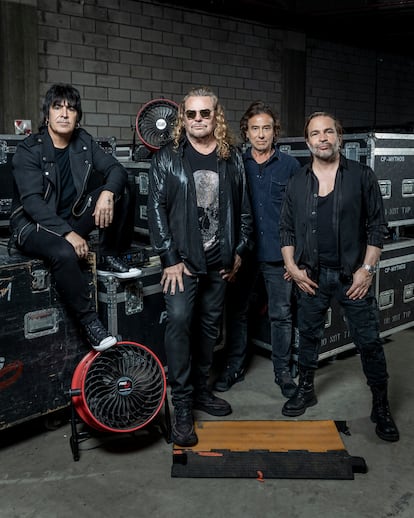Maná: ‘When we come to the United States, we don’t sing to them in the language of the boss, but rather the one their mothers taught them’
Four decades after they started out, the Mexican band’s energy is intact. After the success of their last tour in the Americas, they will head to Spain for a reunion with their fans after eight years

Fher Olvera believes — no, he knows, at his 64 years of age, that the songs are what will truly stand the test of time. “People forget, maybe they will forget about us, about what we did, but the songs…” He doesn’t finish the end of his sentence. But he communicates it with his gaze, with his body language, and in a way, that is all the more compelling. He looks out of the window of the bus into the electrifying, raging night of Buenos Aires. Judging from how fans scream his lyrics there, in a city where Maná has sold out five nights at its 15,000-seat Movistar Arena, he might be right. And given that on this new tour, which kicked off in February in Asunción, Paraguay, where fathers, children and grandparents amassed to sing the band’s four decades’ worth of triumphant Latin American rock, mariachi, salsa, cumbia, reggae, bolero and rhythm and blues hymns, it would appear that time will prove him right.
As the years pass, so too do Maná's pre-concert rituals. They are all well aware that nothing must shake their focus. Olvera strolled through the Palermo neighborhood, unconcerned by the selfie-taking fans he encountered along the way, but now he is doing his stretching exercises while warming up his voice in the dressing room, which is scented with the clove, cinnamon and rosemary of his toning creams. Juan Calleros plucks out a few scales, and for the sake of the concert, has not partaken in one of his beloved hobbies on that day: heading for the sky in a light aircraft. Sergio Vallín hasn’t eaten anything in six hours so that he can take the stage hungry, and performs finger exercises. As for Alex González, he took a peaceful, two-hour nap after eating a plate of pasta to ensure he has the energy necessary to splinter six or eight drumsticks, and potentially one of the drums, from his setup out on the stage.
The Argentinean capital awaits them, vociferous and convulsive. Once again. The Mexican band made their last stop here in March, as part of a tour they began enthusiastically, no fear, but lots of caution. They had not connected with Latin American audiences for eight years. During that time, they had played up north for those they consider their brothers and sisters in the United States, a sector of their fan diasporas and its descendants who worship the group. They may have started the tour cautiously, but support at the box office became evident, and they will ride this train to its finale at London’s OVO Arena Wembly on July 13. In the interim, they will play 11 concerts in Spain — beginning with Barcelona on June 9 and ending in Chiclana de la Frontera on July 11 — and nearly every ticket has already been sold.

Each of these reunions produces certain concerns. But their worries largely vanished during the Latin American dates, amid the warmth of the voices that chanted the lyrics to their songs. “We are a band that doesn’t take anything for granted, we go step-by-step,” says Olvera. “We started cautiously, but tickets flew and look, after all these crises, after so many artists who have spun in our orbit, we have realized that previous generations have passed the baton to their children. Despite the fact that something called reggaeton entered the scene, we feel a lot of support from young audiences. It seems that, like trout, we are swimming against the current, but music makes magic and here we are, harvesting something we sowed a long time ago.”
Today, perhaps, they feel a little out of place, but the reality is that they’re right where they’ve always been. Loyal to what they represent. They began sowing these seeds 38 years ago, in 1986. In those days, the band was called Green Hat, a group that Olvera founded in 1978 with guitarist Gustavo Orozco and three of the 13 Calleros brothers: Juan, Ulises and Abraham, of whom only the former, the bass player, remains in the band. The latter of the three played the drums, but decided to quit. Ulises followed later, making way for the incorporation of Vallín after the band had already transformed into Maná. Before that transition, Green Hat put an ad in a newspaper looking for a drummer and connected with a young guy who seemed to carry percussive skills in his blood, and sticks in his hands almost since birth. Alex González was his name. Later, they’d nickname him El Animal.
González’s mother had been looking to buy some secondhand drums. The ones they had brought from Miami, in a move to Mexico City driven by divorce, were seized in customs. “I just wanted a black Tama like the one I’d had before. My mom was worried. It was just that without any friends in the city and without my drumkit, she was afraid I’d go crazy.” As she perused the pages of the Excelsior newspaper, she came across another ad: “Well-known group seeks drummer between 15 and 21 years old with more than nine years of experience.” His mother hid it from him for two weeks. “I knew that if he saw it, he’d leave me.” And he did. “That day, I boarded a train for the first time,” he says. He got off in Guadalajara, where the band hired him as soon as he auditioned. He was 15 years old and had never studied music, but he wielded a kind of diabolical control over those drums.

A key detail: Green Hat, true to its English-language name, had British references: The Beatles, The Rolling Stones, The Police… Today, they are remembered as Sombrero Verde. They understood the future did not consist of mimicking these heroes, but rather, seeking out their own path in a world that was racked with turmoil and that needed new voices. That’s why they decided to sing in Spanish. They were also firm on the fact that they would not be moving away from Mexico. That advice came from a legend: Miguel Ríos. Much would be happening in the world of rock and pop. “Hang in there. Stay,” he told them. “You’ll get out soon.”
Those were two pieces of advice that proved fundamental to the group’s subsequent development. Another key factor was the incorporation in 1995 of Vallín, after Ulises Calleros decided to hang up the guitar and continue with the group as its manager. The guitarist came from Aguascalientes, where he lives to this day. They didn’t know how long he’d last, but he quickly became a part of the machine. He brought with him his restless touch, indebted as much to the rock and melody of Latin rhythms as to those of flamenco. Also, his humble search for a musical idea to call his own. Today, he is proud of what the group has accomplished. “Maná has transcended time; people are still in love with our music.”

With its four definitive members in alignment, the band was free to develop its boundary-breaking Latin and fusion music in the mid 1990s. Their perfect rapport led to a collective creation whose consequences would resound across the globe. Their sound was influenced by Lennon and McCartney and Bob Marley, in addition to José Alfredo Jiménez and Rubén Blades. To this day, Maná's formula combines Olvera’s charisma and leadership, González’s exuberant and diabolic power, the melodic and elegant sensibility of Vallín with the discreet and quiet strength of Juanito Calleros.
From then on, no one could stop them on the road to establishing a “before” and “after” in pop music via more than 50 million albums sold — 256 platinum releases and 133 gold — in addition to 12 Grammys, including eight Latin Grammys, from an organization that paid them homage in 2018 with a performance during the ceremony featuring Pablo Alborán, Enrique Bunbury, Sebastián Yatra and Vetusta Morla, among others, who performed Maná's most celebrated songs.
The group’s current return to the stage marks a happy reunion. It’s taking place without having headed to the studio to make new music — the last time they did that was in 2015, when they put out Cama incendiada (Bed on fire). Aside from compilations and concert recordings, their discography consists of just nine albums. Maná came first, in 1987. It was not a success. They tried again in 1990 with Falta amor… (Love is missing…), which also initially missed its mark. Desperate, they nearly abandoned the project. “I had fought two times with Fher,” remembers González. The next bout could have been the last. “We shared an apartment, we didn’t have enough for eggs or bread, long story short, we were a little bit messy in terms of partying. I could tell we had a lot of potential and good material at the time, but we were distracted…” González said that he was leaving and Olvera asked him to give him a couple of months to find a replacement. “Actually, a song saved us,” says the drummer. Rayando el sol (Sun is shining) began to play on all the radio stations. It was then that their doubts faded away, and they began to smell success on the wind.
The 1990s were a truly prodigious decade for Maná. “Fher and I knew what the band had to sound like, and we pursued that idea with the creation of ¿Dónde jugarán los niños? (Where will the children play?; 1992): total lift-off,” says González. They began to be able to leave their country, without abandoning it. Their radically Latin, Mexico-based rock en español turned them into global artists. Ríos had been right. “He said it when we were still Green Hat, without any sense of premonition,” says the Grenada-raised musician, who is now close to celebrating his 80th birthday on June 7. “Much less being aware that later on, we would take over the world as Maná.”
He carries much of the responsibility for that success, although he thinks that Ríos’ 1987 concert album Rock and Ríos also played a role. “I could see that the young groups were desperate. They couldn’t play nearly anywhere and they all wanted to leave. Still, I felt like something big was about to happen and of course, that they should change this idea that they had to sing in English, to do it instead in Spanish. I think that Rock and Ríos served as a catalyst.”
That’s why, nowadays, González finds it strange that the album isn’t mentioned in documentaries like Break it All: The History of Rock in Latin America, which completely skips over Ríos’ contributions. It does mention Maná, but the omission of the Andalusian artist strikes González as scandalously unjust. It was Ríos, more than anyone else, who convinced hundreds of young Spaniards to approach their language as a source, not of resistance to English, but of push and pull.

Today, Olvera has profoundly integrated this concept into his discourse. To better explain, he turns to one of his biggest influences: Octavio Paz, whose poem Piedra del sol (Stone of the sun) provided words that served as inspiration for the title of one of Maná's most famous albums. To love is to fight. “The maestro said that language lives in perpetual change and movement, but those changes guarantee its continuity and that movement, its permanence. Thanks to its variations, Spanish continues to be a universal language,” he says. It’s still a linguistic minority in the United States, but a persistant one. And that fact has allowed the group to triumph in that country in a major way, though their impact could have been greater had they not decided to turn down certain opportunities. “Several times, they offered to turn us into even bigger stars through a kind of career that they call ‘360-degrees’ in the industry. That meant that we would stop singing in Spanish. We turned it down,” he says. “We knew that when we go to the United States and we do it in our language, we are playing to a minority, maybe the biggest minority, but a minority. We don’t sing to them in the language of the boss, but rather in the language they learned from their mother, from the land, from their people. It bothers the segment of gringos who are ignorant and racist when we speak Spanish in their country, but I don’t think we should give them the satisfaction of changing.”
It’s with declarations like this that Olvera has marked his territory. And political leaders have taken note. Barack Obama invited the group to support his presidential re-election campaign. Before they agreed, they wanted to make sure that he would create policy that helped immigrants. He promised them that he would. Then came Trump. They continued to sing. Then, Biden… Today, that battle continues, faced with too many unsettling unknowns. Olvera and his group dream of a counterbalance that a Latin America united through one language could exert. “Without language, there’s no common ground for achieving that unity. To count as one people, we can’t deny what we are, our cultural heritage, expressed in our mother tongue. English, Spanish, and Portuguese are spoken in the Americas. Our countries are essentially the product of racial mixing and colonialism. Like it or not, that’s our essence and our reality,” Olvera says. A reality, as he previously mentioned, that implies movement. “Us Latinos are still out there, trying to find our identity and our place in the world. We look for our destiny and we continue to develop. As the world stays still, we continue to migrate.”
When the time comes to get on stage, Olvera puts on a black shirt to which he adds a silk turquoise jacket. He puts on James Brown’s Sex Machine to bring the group together before they start the show, motivating them with pure dynamite soul. On tour, the same songs over and over, combined with new beats every night to ratchet up energy levels, achieve those vibes that once fascinated the members of Coldplay, who told Maná that they’d never seen a live show like theirs, and asked for advice on how to improve their own onstage presence.

Once again, the group has collaborated with filmmaker Adrián Zurita in the design of their México lindo y querido (Beautiful and beloved Mexico) tour: “There has to be dramatic composition in the concerts. Plot, conflict and resolution,” says Zurita. “A structure, a narrative that takes you by the hand for this musical journey of more than two hours. With climaxes, ballads, rests and final take-offs. We play with resources: video, pyrotechnics, special effects, to support Maná's music. But we know that no two days are alike, and that things happen all the time. That’s why they never get tired.”
They know that everything needs to function perfectly, so as to never stop surprising the public. In addition, on this tour, González, Vallín and Calleros insisted that Olvera relax a little. The drummer pulls no punches when it come to this reasoning: “Fher has always been our leader, but he can’t be fixing a hundred things at a time. He has to feel good to be able to sing his best and have a good time onstage. Not resolving different problems like he was before with marketing, the managers… He was on top of everything, and couldn’t let it go. Now we have impeccable organization and staff. They’re mature, they’re good and what my brother has to do is get ready to enjoy himself and not battle with anyone. That wasn’t life. It sucks your energy and the only thing that should be doing that is the crowd.” His excessive perfectionism and lack of trust in delegating tasks weighed down the singer. But no longer, says Olvera: “We’re having more fun than ever. It sounds strange, but we’ve been doing this for a while. We artists are pretty crazy, and you can get worried about a light or a camera not working. But I’ve learned to accept mistakes, to realize that they are human. Now, I let loose and enjoy it to the fullest.”
Sign up for our weekly newsletter to get more English-language news coverage from EL PAÍS USA Edition
Tu suscripción se está usando en otro dispositivo
¿Quieres añadir otro usuario a tu suscripción?
Si continúas leyendo en este dispositivo, no se podrá leer en el otro.
FlechaTu suscripción se está usando en otro dispositivo y solo puedes acceder a EL PAÍS desde un dispositivo a la vez.
Si quieres compartir tu cuenta, cambia tu suscripción a la modalidad Premium, así podrás añadir otro usuario. Cada uno accederá con su propia cuenta de email, lo que os permitirá personalizar vuestra experiencia en EL PAÍS.
¿Tienes una suscripción de empresa? Accede aquí para contratar más cuentas.
En el caso de no saber quién está usando tu cuenta, te recomendamos cambiar tu contraseña aquí.
Si decides continuar compartiendo tu cuenta, este mensaje se mostrará en tu dispositivo y en el de la otra persona que está usando tu cuenta de forma indefinida, afectando a tu experiencia de lectura. Puedes consultar aquí los términos y condiciones de la suscripción digital.









































